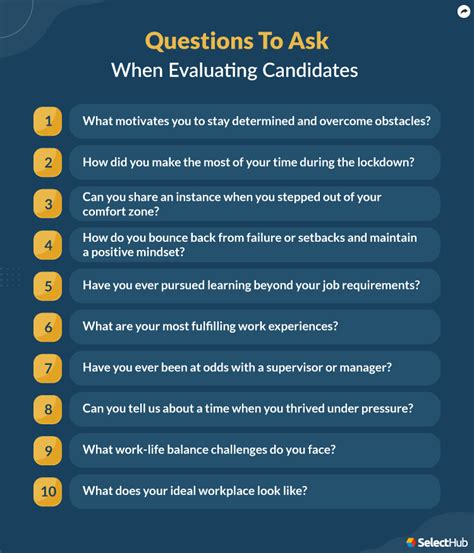Conducting an effective job interview is crucial for finding the right candidate for a position. It's not just about assessing the candidate's skills and experience, but also about understanding their thought process, behavior, and fit with the company culture. Strategic interview questions can help you evaluate a candidate's potential for success in the role and determine whether they would be a valuable addition to your team. In this article, we will explore the importance of strategic interview questions, provide examples of effective questions to ask candidates, and discuss how to use the responses to make informed hiring decisions.
Key Points
- Strategic interview questions help assess a candidate's skills, experience, and fit with the company culture.
- Behavioral questions can provide insight into a candidate's past experiences and behaviors.
- Situational questions can help evaluate a candidate's problem-solving skills and decision-making abilities.
- Cultural fit questions can assess a candidate's values, beliefs, and work style.
- Follow-up questions can provide additional information and help clarify a candidate's responses.
Types of Strategic Interview Questions

There are several types of strategic interview questions that can be used to assess a candidate’s qualifications and potential for success. These include:
Behavioral Questions
Behavioral questions are designed to assess a candidate’s past experiences and behaviors. These questions typically start with “Tell me about a time when…” or “Can you give an example of…”. The goal is to understand how the candidate has handled similar situations in the past and how they might behave in the future. Examples of behavioral questions include:
- Tell me about a time when you overcame a difficult challenge in your previous role.
- Can you give an example of a project you managed from start to finish?
- Describe a situation where you had to work with a difficult team member.
Situational Questions
Situational questions are designed to evaluate a candidate’s problem-solving skills and decision-making abilities. These questions present a hypothetical scenario and ask the candidate to describe how they would handle it. Examples of situational questions include:
- What would you do if you were tasked with leading a team project and one of the team members was not pulling their weight?
- How would you handle a situation where a customer is complaining about a product or service?
- Describe a scenario where you had to make a difficult decision with limited information.
Cultural Fit Questions
Cultural fit questions are designed to assess a candidate’s values, beliefs, and work style. These questions can help determine whether a candidate would be a good fit for the company culture and work environment. Examples of cultural fit questions include:
- What motivates you to come to work every day?
- Can you tell me about a time when you had to adapt to a new work environment or culture?
- How do you handle feedback or constructive criticism?
Follow-up Questions
Follow-up questions are designed to provide additional information and help clarify a candidate’s responses. These questions can be used to drill down into specific details or to explore a particular topic in more depth. Examples of follow-up questions include:
- Can you provide more details about that experience?
- How did you handle that situation?
- What did you learn from that experience?
| Question Type | Example Question | Purpose |
|---|---|---|
| Behavioral | Tell me about a time when you overcame a difficult challenge. | Assess past experiences and behaviors. |
| Situational | What would you do if you were tasked with leading a team project? | Evaluate problem-solving skills and decision-making abilities. |
| Cultural Fit | What motivates you to come to work every day? | Assess values, beliefs, and work style. |
| Follow-up | Can you provide more details about that experience? | Provide additional information and clarify responses. |

Best Practices for Asking Strategic Interview Questions

When asking strategic interview questions, there are several best practices to keep in mind. These include:
Prepare Relevant Questions
Prepare a list of relevant questions that are tailored to the job requirements and company culture. This will help you stay focused and ensure that you’re assessing the candidate’s qualifications and potential for success.
Use a Conversational Tone
Use a conversational tone when asking questions. This will help put the candidate at ease and encourage them to open up and share their thoughts and experiences.
Listen Actively
Listen actively to the candidate’s responses. This will help you understand their perspective and provide valuable insights into their qualifications and potential for success.
Avoid Biased Language
Avoid using biased language or asking questions that could be perceived as discriminatory. This will help ensure that you’re treating all candidates fairly and equally.
Take Notes
Take notes during the interview. This will help you remember the candidate’s responses and provide a record of the interview that you can refer to later.
What is the purpose of strategic interview questions?
+The purpose of strategic interview questions is to assess a candidate's qualifications and potential for success in a role. These questions help evaluate a candidate's skills, experience, and fit with the company culture.
What types of questions should I ask in an interview?
+You should ask a combination of behavioral, situational, cultural fit, and follow-up questions. These questions will help you assess a candidate's past experiences, problem-solving skills, values, and work style.
How can I ensure that I'm asking effective interview questions?
+To ensure that you're asking effective interview questions, prepare relevant questions, use a conversational tone, listen actively, avoid biased language, and take notes during the interview.
By using strategic interview questions and following best practices, you can assess a candidate’s qualifications and potential for success in a role. Remember to prepare relevant questions, use a conversational tone, listen actively, avoid biased language, and take notes during the interview. With the right approach, you can make informed hiring decisions and find the best candidate for the job.
